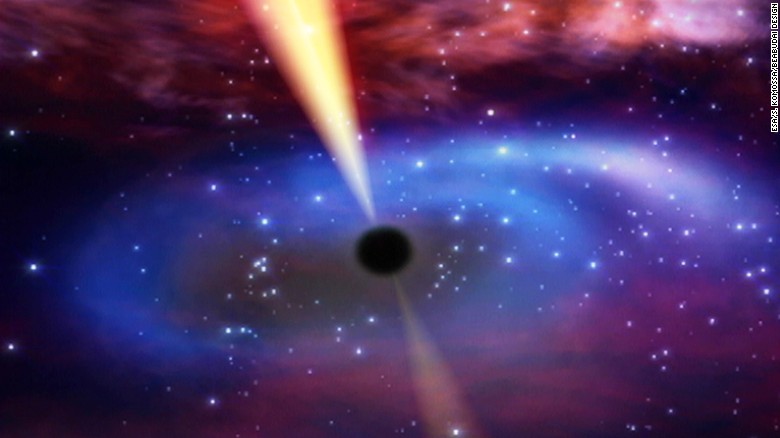Astronomers capture supermassive black hole as it eats passing star
Source: cnn
Astronomers capture supermassive black hole as it eats passing star
By James Griffiths, CNN
Updated 10:32 PM ET, Wed July 6, 2016

Rendering shows jets of particles ejected as a star is consumed by a black hole.
(CNN)A star, caught in the grips of a supermassive black hole.
The immense gravity slowly strips the stellar material from its parent, forming a disc of gas around the black hole as it converts gravitational energy into electromagnetic radiation, producing a bright source of light visible on multiple wavelengths.
.....................
See black hole shred passing star 00:57
An international team of astronomers, led by Jun Yang at Sweden's Chalmers University of Technology, used the European VLBI Network (EVN) to study the event known as Swift J1644+57.
First discovered in 2011, Swift J1644+57 is a supermassive black hole slowly swallowing a star. Or rather, was, the galaxy in which the incredible astronomical event is taking place is so far away its light takes 3.9 billion years to reach Earth.
As the ancient star was sucked into the black hole, Yang says it produced jets of light and particles equivalent to the size "of a 2 euro coin on the Moon as seen from Earth." ............
Read more: http://www.cnn.com/2016/07/06/health/black-hole-star-radio-telescope/index.html
I am always fascinated by what we are able to know --or not know about about our universes.
Separation
(1,975 posts)Surya Gayatri
(15,445 posts)GummyBearz
(2,931 posts)And one that was a big hit with the ladies in my single college years... drop the science behind how we are all made of star dust and move on to second base
JohnnyRingo
(18,628 posts)Thanx for posting.
Night Watchman
(743 posts)...shouldn't we all be dead now? ![]()
K&R
JustABozoOnThisBus
(23,339 posts)Anything that happened 3.9 billion years ago is probably not Late Breaking!
Anyway, thanks for posting. Interesting story and photo.
NWCorona
(8,541 posts)PersonNumber503602
(1,134 posts)Blue_Tires
(55,445 posts)bvar22
(39,909 posts)If the gravity in and around a black hole is so strong that even light can't escape,
how can particles be ejected?
Separation
(1,975 posts)Is that even black holes can only absorb so much matter. The star particles that it can't absorb is belched out.
I only know what I'm told by the science discovery channel, so take this info not as gospel. ![]()
cemaphonic
(4,138 posts)Broadly, there are 3 things that can happen:
1) It could crash into the Earth.
2) If the velocity and trajectory are just right, the meteor will be captured by Earths gravity and go into orbit.
3) If it is coming in fast enough, it will exit Earth's gravitational pull, but its trajectory and velocity will be altered while under Earth's influence. We have used this case several times in our own space program, such as when we used Jupiter's gravity to accelerate the New Horizons probe on its way to Pluto.
Black holes have a gravitational feature known as an "event horizon," which is the point beyond which not even light can escape. Anything entering the event horizon suffers the first fate, which is what you're thinking of. But the gravitational influence of a black hole extends far beyond its event horizon, so a lot of the matter being pulled towards a black hole will either settle into orbit, or be flung away at extremely high velocities (near light speed in some cases).
If it wasn't for all of the matter (and light) being flung away from black holes, we wouldn't be able to detect them - they would remain a purely theoretical construct.
NWCorona
(8,541 posts)The best way to describe the theory is this IMHO. The event horizon can affect the production of matching pairs of particles and anti particles. Now imagine them stuck together like magnets. As the gravitational forces ripe them apart picture the negative particle turning and ejecting the positive free.
Other factors are at play like frame dragging so the black hole would actually be spinning.
rug
(82,333 posts)riversedge
(70,204 posts)know how to calculate its age. I always thought that figure was its age? ??
...........First discovered in 2011, Swift J1644+57 is a supermassive black hole slowly swallowing a star. Or rather, was, the galaxy in which the incredible astronomical event is taking place is so far away its light takes 3.9 billion years to reach Earth. ...
rug
(82,333 posts)ChairmanAgnostic
(28,017 posts)Seriously, is there a mathematical limit as to how much a black hole can eat?
NWCorona
(8,541 posts)ChairmanAgnostic
(28,017 posts)In the first few seconds there was massive inflation, matter had not yet come to be, but the pressures and temps were beyond imagination.
Why did the galaxies form, rather than one big black hole encompassing all of matter? I am sure that the densities that existed extremely early on were on the same level as what exists at a black hole's event horizon now.
november3rd
(1,113 posts)That's why they're called "black."